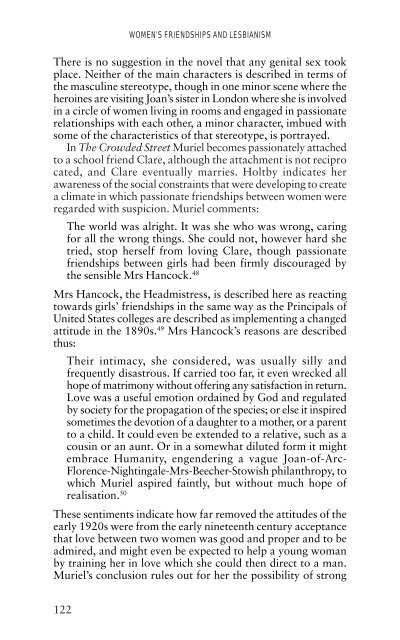The Spinster and Her Enemies - Feminish
The Spinster and Her Enemies - Feminish
The Spinster and Her Enemies - Feminish
You also want an ePaper? Increase the reach of your titles
YUMPU automatically turns print PDFs into web optimized ePapers that Google loves.
WOMEN’S FRIENDSHIPS AND LESBIANISM<br />
<strong>The</strong>re is no suggestion in the novel that any genital sex took<br />
place. Neither of the main characters is described in terms of<br />
the masculine stereotype, though in one minor scene where the<br />
heroines are visiting Joan’s sister in London where she is involved<br />
in a circle of women living in rooms <strong>and</strong> engaged in passionate<br />
relationships with each other, a minor character, imbued with<br />
some of the characteristics of that stereotype, is portrayed.<br />
In <strong>The</strong> Crowded Street Muriel becomes passionately attached<br />
to a school friend Clare, although the attachment is not recipro<br />
cated, <strong>and</strong> Clare eventually marries. Holtby indicates her<br />
awareness of the social constraints that were developing to create<br />
a climate in which passionate friendships between women were<br />
regarded with suspicion. Muriel comments:<br />
<strong>The</strong> world was alright. It was she who was wrong, caring<br />
for all the wrong things. She could not, however hard she<br />
tried, stop herself from loving Clare, though passionate<br />
friendships between girls had been firmly discouraged by<br />
the sensible Mrs Hancock. 48<br />
Mrs Hancock, the Headmistress, is described here as reacting<br />
towards girls’ friendships in the same way as the Principals of<br />
United States colleges are described as implementing a changed<br />
attitude in the 1890s. 49 Mrs Hancock’s reasons are described<br />
thus:<br />
<strong>The</strong>ir intimacy, she considered, was usually silly <strong>and</strong><br />
frequently disastrous. If carried too far, it even wrecked all<br />
hope of matrimony without offering any satisfaction in return.<br />
Love was a useful emotion ordained by God <strong>and</strong> regulated<br />
by society for the propagation of the species; or else it inspired<br />
sometimes the devotion of a daughter to a mother, or a parent<br />
to a child. It could even be extended to a relative, such as a<br />
cousin or an aunt. Or in a somewhat diluted form it might<br />
embrace Humanity, engendering a vague Joan-of-Arc-<br />
Florence-Nightingale-Mrs-Beecher-Stowish philanthropy, to<br />
which Muriel aspired faintly, but without much hope of<br />
realisation. 50<br />
<strong>The</strong>se sentiments indicate how far removed the attitudes of the<br />
early 1920s were from the early nineteenth century acceptance<br />
that love between two women was good <strong>and</strong> proper <strong>and</strong> to be<br />
admired, <strong>and</strong> might even be expected to help a young woman<br />
by training her in love which she could then direct to a man.<br />
Muriel’s conclusion rules out for her the possibility of strong<br />
122

















